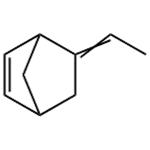
5-ETHYLIDENE-2-NORBORNENE
- Product Name5-ETHYLIDENE-2-NORBORNENE
- CAS16219-75-3
- MFC9H12
- MW120.19
- EINECS240-347-7
- MOL File16219-75-3.mol
Chemical Properties
| Melting point | -80.15°C |
| Boiling point | 146 °C(lit.) |
| Density | 0.893 g/mL at 25 °C(lit.) |
| vapor density | 4.1 (vs air) |
| vapor pressure | 4.6 mm Hg ( 20 °C) |
| refractive index | n |
| Flash point | 101 °F |
| storage temp. | Flammables area |
| solubility | Chloroform (Slightly), Hexanes (Slightly) |
| form | Liquid |
| color | Colorless to Almost colorless |
| explosive limit | ~6.4% |
| Water Solubility | Soluble in water (0.01% at 20C). |
| Exposure limits | ACGIH: TWA 2 ppm; STEL 4 ppm NIOSH: Ceiling 5 ppm(25 mg/m3) |
| Stability | Volatile |
| InChI | 1S/C9H12/c1-2-8-5-7-3-4-9(8)6-7/h2-4,7,9H,5-6H2,1H3/b8-2+/t7-,9-/m0/s1 |
| InChIKey | OJOWICOBYCXEKR-WHZSQGQPSA-N |
| SMILES | C\C=C1/C[C@H]2C[C@@H]1C=C2 |
Safety Information
| Hazard Codes | Xn,N |
| Risk Statements | 10-22-36/37/38-65-51/53-48/20-43-38-20 |
| Safety Statements | 16-26-36/37/39-62-61 |
| RIDADR | UN 2929 6.1/PG 2 |
| OEL | Ceiling: 5 ppm (25 mg/m3) |
| WGK Germany | 2 |
| RTECS | RB9450000 |
| TSCA | TSCA listed |
| HazardClass | 3 |
| PackingGroup | III |
| HS Code | 29021990 |
| Storage Class | 3 - Flammable liquids |
| Hazard Classifications | Acute Tox. 4 Inhalation Aquatic Chronic 2 Asp. Tox. 1 Flam. Liq. 3 Skin Irrit. 2 STOT RE 2 Inhalation |
| Hazardous Substances Data | 16219-75-3(Hazardous Substances Data) |


